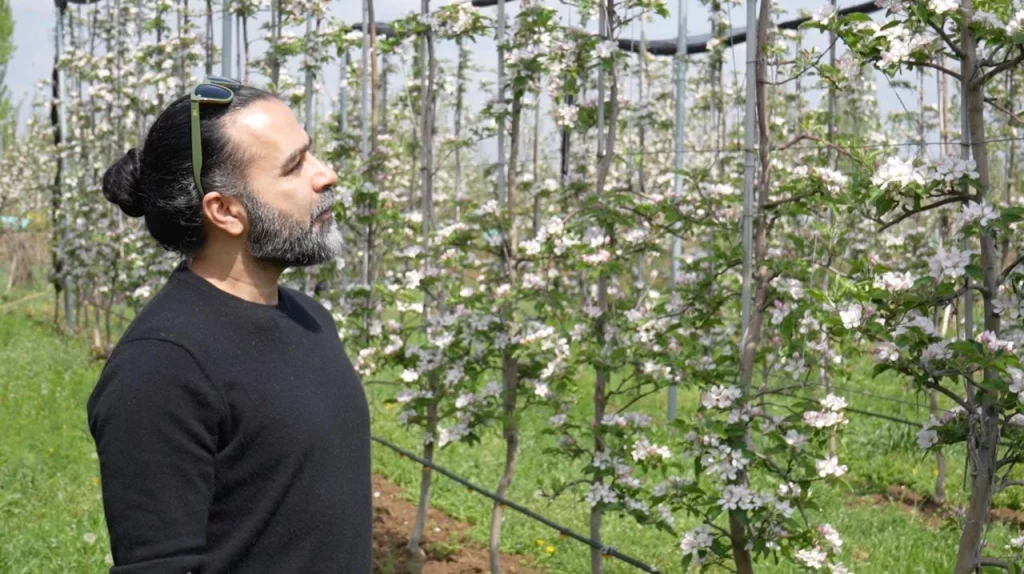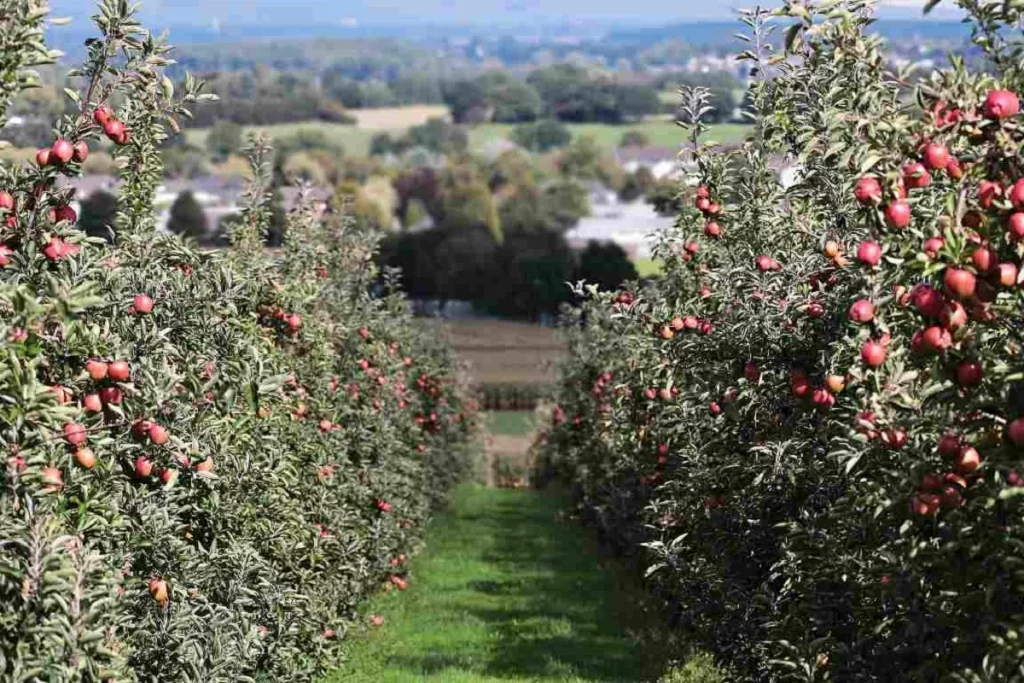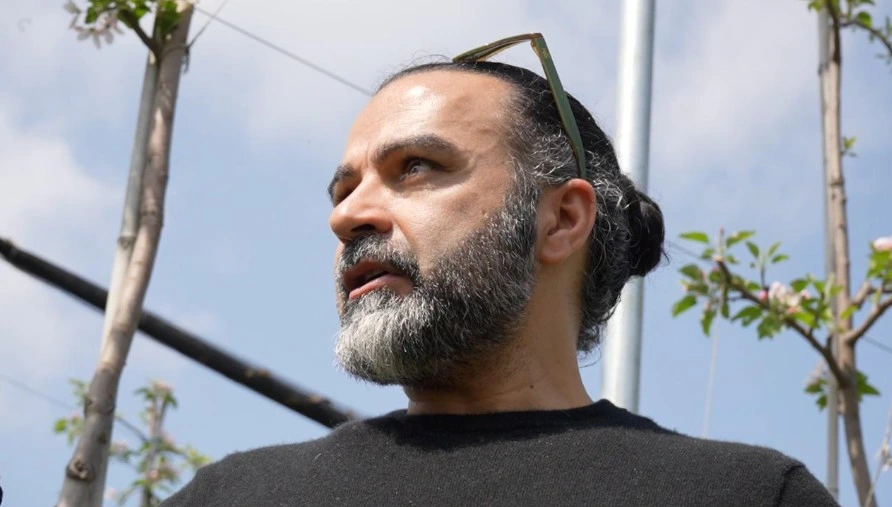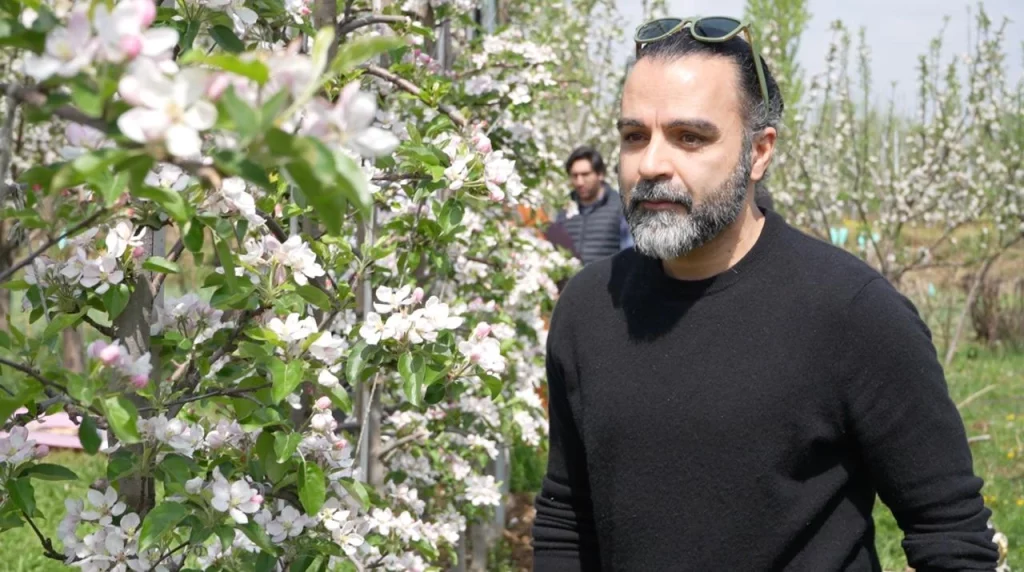(August 13, 2025) Growing up in the Kashmir valley in the 1990s was tough. Khuram Mir was among those who experienced it first hand. Back then, insurgency was at its peak, massive anti-India demonstrations, strikes and rallies crippled normal life in the valley. Yet, education and community provided some form of stability to Khuram. He spent most of his time in Srinagar, where he was pursuing his education, while weekends and holidays were spent in his ancestral village in Shopian in south Kashmir, known as the apple bowl of Kashmir, which was then a hotbed of terrorism.
That duality of urban and rural life shaped his understanding of both worlds. It took him all the way to the US and brought him back where it all started — Kashmir. “Ironically, I once said I would never work in the apple business. Today, I’m precisely doing that, but with a purpose and scale that makes it deeply fulfilling. “Life has come full circle,” smiles Khuram Mir during a chat with Global Indian. The entrepreneur who is the Founder and CEO of Qul Fruits has revolutionised the valley’s apple industry.
View this post on Instagram
First to bring foreign investment in Kashmir
Qul Fruits was the first company to bring foreign investment into Kashmir, setting a precedent and proving that global capital can be aligned with rural, high impact geographies. “I have seen the challenges of apple trade and how little dignity and predictability there was in farming, since my childhood,” says Khuram, an alumnus of Purdue University, who is on a mission to revolutionise the horticulture sector in the Himalayas.
Launched in 2009, his company now operates across 2,500 acres, works with over 15,000 apple growers and runs 14 post-harvest hubs called Qulgahs, which serve as their phygital farmer engagement centres.
Transforming horticulture in Kashmir
Qul Fruits was born out of a mission, to use science, technology, and structured systems to transform horticulture in Kashmir. “Qul is more than a company; it’s a movement centered on farmer dignity, profitability, and sustainability,” says Khuram, who pioneered the introduction of high-density apple plantations, replacing traditional methods with compact, vertically growing varieties that produce early, are more resilient, and yield up to five times more per acre.
He also built the DIMO model: Design, Install, Manage, and Operate, offering full-stack solutions to farmers.

Investment from Belgium
“Last year, we secured a significant investment of INR 60 crore (EUR 6.7 million) from Incofin, a European impact investor based in Belgium, and Fielding, an Indian platform,” informs Khuram, who has received numerous awards including the State Entrepreneurship Award, and continues to be recognized as a model for socially impactful enterprise from the Global South.
Notably, Qul Fruits is the first and only company in Kashmir to be funded by an international impact investment fund, and this has helped open the floodgates for more global capital into the region. “We also collaborate with Dutch and Italian research institutes and nurseries, and are building a globally representative board with leaders from the US, Europe and India,” he mentions.
Women empowerment
Khuram is particularly proud of the fact that his firm leads in women empowerment. The company has several women on board, and many operational and strategic decisions are driven by them. “The local families have broken norms to support their daughters in working with Qul, which is rare and inspiring in our socio-cultural context.”
Creating an apple ecosystem
The entrepreneur’s ideas of apple cultivation encouraged others in the business to follow him. “When we started, we were alone in our mission. Today, the apple ecosystem in Kashmir has evolved significantly. Our first 2,000 MT facility became a benchmark and now the region boasts over 300,000 MT in cold storage capacity,” explains Khuram, pointing out that multiple players have entered the space, drawing from his model.
Qul continues to lead in key services like high density orchard development with over 70 per cent market share. “More importantly, our influence has transformed this from a single-company initiative to a sector-wide movement,” he says.
The farmers’ response has been overwhelmingly positive. “Once they experienced the benefits — from higher yields and structured processes to improved income stability — they became our most passionate ambassadors.,” smiles the entrepreneur.

Harvard Business School study on Khuram’s company
The Harvard Business School (HBS) had conducted a case study about Kashmir’s apple economy and why it was heading for crisis. It was conducted on HN Agri Serve, a company Khuram founded before Qul Fruits. Titled HN Agri Serve: Growing Prosperity, the case study was published on December 4, 2014 and became part of the MBA curriculum at HBS and other business schools.
“The study focussed on Kashmir’s fragile but vital apple economy, a sector providing livelihoods to over 700,000 families and contributing significantly to the region’s GDP,” the entrepreneur says.
Elaborating further, he mentions that despite its economic significance, the sector was hampered by outdated orchard practices, high post-harvest losses, lack of scientific inputs and market inefficiencies. “HN Agri Serve addressed these challenges by creating an end-to-end ecosystem: from world class nurseries and high-density plantation models to farmer-centric financial products,” says Khuram.
What caught Harvard’s attention was that this was a grassroots, community-rooted enterprise operating in a conflict-prone rural region. “The case placed the Kashmiri farmer at the centre of a global conversation, portraying them not as victims but as resilient contributors to economic prosperity. This intellectual framework ultimately laid the foundation for Qul Fruits.”
A Kashmiri upbringing and dreams that reached Purdue
Khuram comes from a humble background. His father, who lost his own father at a young age, started from nothing in the village of Pinjora in Shopian. Despite not having access to college education himself, he ensured his children had the best schooling. “He built himself up through apple trading and gradually developed his own orchards. His journey was nothing short of heroic,” says Khuram, describing his mother as a constant pillar of strength.
Born in 1981 in Kashmir and raised during the tumultuous 1990s, Khuram studied at Tyndale Biscoe School in Srinagar, which was established in 1880 and holds a legacy of quality education in Jammu & Kashmir. “Conflict was a constant backdrop. Despite the unrest, I cherished my time there,’ he reflects.
Academically, he was passionate about mathematics and physics, and always had an interest in languages, especially Urdu. Additionally, he was active in sports, from basketball and soccer to long distance running. After completing his schooling, Khuram took the SAT and TOEFL exams and gained admission into several prestigious universities in the United States. He eventually chose Purdue University in Indiana, a global leader in engineering and mathematics education.

Life at Purdue
At Purdue, Khuram pursued his bachelor’s in Industrial Engineering and later earned a master’s degree in Operations Research and Industrial Systems Engineering. He also worked as a consultant in a hands-on program that engaged directly with industries.
“Studying at Purdue was life-changing. I had incredible mentors who worked as a teaching and research assistant and even consulted for industry,” says the entrepreneur, highlighting that learning alongside some of the brightest minds made him value rigor and systems thinking. “It was humbling and empowering.”
Working in a global environment
Between June 2006 and January 2009, Khuram worked as a manufacturer integration engineer at Micron Technology, Baltimore. “I was part of a global team working on reducing chip production cycle time. The parallels between chip logistics and fresh fruit supply chains were striking,” he says.
He developed and modelled functionalities of an end-user production scheduler called MACH, employing heuristics assignment and deterministic algorithms. He also built and analyzed planning models of the fabrication plant based on cycle time employing queuing theory.
Return to Kashmir and beginning of a mission
Khuram says the decision to return to Kashmir was not easy. “I planned to stay for just a year. But the call to transform horticulture at home was stronger. What began as a short-term idea has now become a 16-year journey,” smiles the entrepreneur.
Though his base continues to be in the US, Khuram spends a significant amount of time in India, particularly Kashmir, thanks to the incredible support of his wife who understands and shares the mission of his work.
View this post on Instagram
The evolving apple industry of J&K
“The industry is evolving. There is greater awareness, better techniques, and infrastructure development,” says Khuram Mir.
However, challenges persist. “Climate volatility, middlemen dependence, poor standardization, and limited digital adoption. Government support is needed for logistics, cold storage, and processing units.” At the same time, he feels farmers must adopt record-keeping, soil diagnostics, and form FPOs to scale sustainably. “Transformation must be both policy-led and grassroots-driven,” he believes.
Game-changing developments
Khuram says the new Srinagar-Katra train line inaugurated by Prime Minister Narendra Modi recently, is a game-changer as the valley has long suffered from poor logistics. “This rail line reduces transit time, cuts costs, and will open up distant markets. But to truly benefit, we must invest in rail-linked cold storage and pack houses at the source,” he says.
Future plans
“We’re just getting started,” smiles Khuram. His vision is to transform Qul into a full-stack horticulture powerhouse covering every stage of the value chain — from high-tech nurseries to market access.
“We’re re-launching our AI-powered app, Farmit, to provide farmers with diagnostics, advisory, input access, warehousing, and market tools,” says the entrepreneur, who is expanding his business to Northeast India, Central Asia, Nepal, and Bhutan.

He aims to impact more than 100,000 farmers in the next five years, scale his global R&D collaborations, and embed ESG (environmental, social and governance) at the core of everything, including gender equity.
Beyond the orchards
When not working, Khuram indulges in running, playing tennis, a sport he picked up while in the US. Above all, he loves mathematics. “I’m still a student at heart and love to solve problems, just like I did 20 years ago,” smiles Khuram, a father of two.
- Follow Khuram Mir on LinkedIn
Also Read: Sammy Kotwani: Stitching culture, community, and Indo-Russian friendship
Also Read: For H-1B workers wondering ‘what if?’: Inspiring journeys of founders who returned to India



